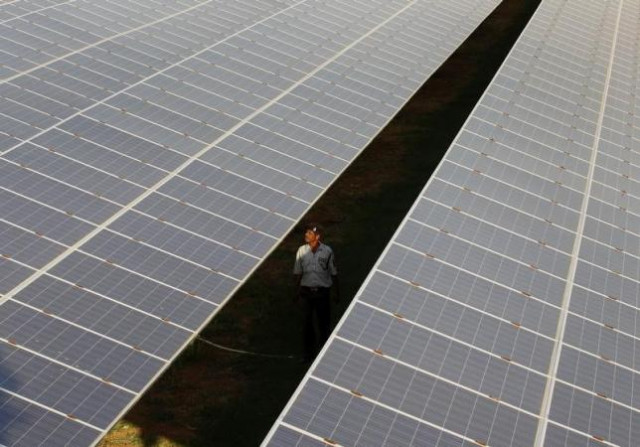Diffusion of PV units remains limited despite advantages
Respondents of study say govt is only providing loans, but not giving incentives

PHOTO: REUTERS
These findings were made in a recently published paper on factors responsible for solar PV adoption at the household level. Lahore city was used as the case study.
Approximately 61% of the respondents reported barriers such as accessibility to vendors and technical expertise when it comes to the installation of solar power units on the household level. A few respondents were of the view that the government was only providing loans to install solar PV system, but not giving incentives in monetary terms.
The research that was recently published in the international journal Renewable and Sustainable Energy Reviews. It was conducted by Tahir Masood Qureshi and Kafiatullah from US-Pakistan Centre for Advanced Studies in Energy (USPCASE), National University of Science and Technology (NUST) Islamabad in collaboration with Maarten J Arentsen from Department of Governance and Technology for Sustainability (CSTM) at University of Twente in The Netherlands.
German project looks to home photovoltaic systems to help grid
The households selected for interviews were both users and non-users of solar PV systems. The aim was to get a comprehensive picture of determinants in solar PV usage. The selection of the interviewees was based on the fact that the interviewee must be the person who is responsible for household decisions regarding solar PV adoption. To gather responses from different socioeconomic types of households, localities such as WAPDA Town, Defence Housing Authority, Johar Town, Township, Allama Iqbal Town, Shaadbagh, Elite Town, Izmir Town, Harbanspura, Shalimar Town, Canal View Colony, Azam Garden, UET Society and Punjab Cooperative Housing Society were included in the study.

The research was based on the premise that the annual average mean daily solar irradiation in Lahore ranges between 5.1 kWh/m2 to 5.4 kWh/ m2, which is promising for solar energy utilisation. However, despite the huge potential, utilisation of solar energy remains lackluster in Pakistan and has not contributed to the energy mix of the country.
According to researchers, the total electricity demand of Pakistan can be met by simply installing solar PV with 20% efficiency on 1% of Balochistan’s land.
2.9 million MW solar energy potential
The study further revealed that the diffusion or adoption of solar PV system in Lahore is not an easy process. Households which chose to do so faced many hurdles regardless of the fact that the system exceeds in advantages as compared to other conventional sources of electricity. The high front cost of solar PV system appeared to be the most significant barrier in diffusion, regardless of its clean and environmentally friendly characteristics. Additionally, the absence of adequate financial support by the government for installation further influenced adoption decisions.
According to the research, in Pakistan, the average cost of a good quality 1 kW solar PV system (panel, inverter, controller and energy meter) without battery backup is around Rs280,000 to Rs330,000. At the same time, the cost of 2 kW and 3 kW capacity solar PV system ranges between Rs530,000 to 800,000. However, the battery backup of three hours increases the cost at the rate of nearly Rs70,000 per kW for the above-mentioned solar PV systems.
Other important barriers included unawareness among the local community, inadequate renewable energy policy, difficulty of using all appliances at the same time and shortage of reliable vendors and technicians.
The researchers were of the view that by and large, the diffusion of solar PV systems at the household level could possibly be increased if the identified significant barriers to adoption decision were properly addressed.
The research recommends that the factor of high upfront cost of solar PV system can be addressed by establishing a financial institution that provides loans/financial support to small potential adopters at zero or low-interest rate for PV system purchase.
According to the researchers, the government must implement the concept of net metering for electricity trade-off, which has not yet practically started in Lahore. They were of the view that net metering could reduce the cost of full solar PV system as the major cost of batteries would be reduced.
Published in The Express Tribune, September 19th, 2017.



















COMMENTS
Comments are moderated and generally will be posted if they are on-topic and not abusive.
For more information, please see our Comments FAQ